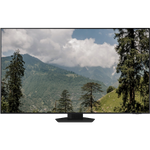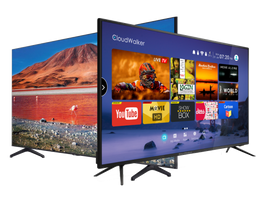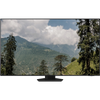A comparison of specs, key information, reviews, and best pricing from top retailers
Last updated -- hours ago | Report incorrect information
What we think

The PerfectRec TV team Learn more
Updated January 10, 2024·
The LG UR9000 generally costs less and has better performance for sports content with wide viewing angles, making it a good choice for group viewing in a bright room. However, it has lower picture quality in dark rooms. On the other hand, the Samsung QN85B is more expensive but offers better overall picture quality, higher brightness, and superior performance for gaming, movies, and HDR content. It would be more suitable for a mixed usage in both bright and dark rooms. Give Feedback
this description is based on the product variant with some specs and product variant with some specs. At the time of writing, the variant with some specs cost some dollars and the variant with some specs cost some dollars.
Advantages of the LG UR9000 (LCD)
- The LG UR9000 (LCD) has no clear advantages over the Samsung QN85B (LCD).
Advantages of the Samsung QN85B (LCD)
- Excellent for bright room
- Good for dark room
- Very good for gaming
- Good for movies & TV
- Good for sports
- Very good for news, talk, & other TV
- Very good for cartoons & animation
- Very good for use as monitor
- Good for upscaling
- Very good reflections
Key differences
Picture Quality
5.4


7.5
3.31/10
CONTRAST
5.64/10
6.0/10
COLOR VOLUME SCORE
7.5/10
LED
PANEL TYPE
miniLED FALD
IPS
PANEL SUB-TYPE
IPS
The Samsung QN85B (LCD) has good picture quality, while the LG UR9000 (LCD) has poor picture quality.
Movies & TV
5.1


7.3
3.31/10
CONTRAST
5.64/10
5.3/10
BLACK UNIFORMITY
5.7/10
5.7/10
UPSCALING
7.5/10
Yes
HDR10 SUPPORT
Yes
No
HDR10+ SUPPORT
Yes
No
DOLBY VISION SUPPORT
No
The Samsung QN85B (LCD) is good for movies & TV, while the LG UR9000 (LCD) is poor.
The LG UR9000 has low contrast, poor local dimming, and weak black uniformity which can degrade movie and cinematic TV viewing by not displaying rich, deep blacks and losing detail in dark scenes. Conversely, the Samsung QN85B offers high contrast, excellent local dimming, and better black uniformity, resulting in more vibrant images and crisper scenes that enhance the overall movie-watching experience.
Gaming
5.7


8.2
6.0/10
RESPONSE TIME SCORE
8.0/10
10.0/10
INPUT LAG SCORE
10.0/10
8.0/10
MOTION PROCESSING
8.0/10
15.0/100
GAMING LOCAL DIMMING
70.0/100
6.3/10
GAME HDR BRIGHTNESS SCORE
9.0/10
The Samsung QN85B (LCD) is very good for gaming, while the LG UR9000 (LCD) is poor.
The Samsung QN85B is better suited for gaming because it has a higher refresh rate, allowing for smoother motion, and also offers a better response time and input lag, leading to quicker screen updates and less delay between user input and on-screen action. In contrast, the LG UR9000 is limited by a lower refresh rate and poorer response time and input lag, which means it will not handle fast-moving gaming scenarios as well.
Cartoons & Animation
5.8


8.0
5.8/10
COLOR GAMUT SCORE
7.2/10
6.0/10
COLOR VOLUME SCORE
7.5/10
6.6/10
SDR BRIGHTNESS SCORE
9.3/10
8.5/10
COLORS OUT OF THE BOX SCORE
7.9/10
7.7/10
GRAY UNIFORMITY
7.2/10
The Samsung QN85B (LCD) is very good for cartoons & animation, while the LG UR9000 (LCD) is poor.
The Samsung QN85B excels in displaying cartoons and animation due to its good color accuracy straight out of the box and wide color gamut, ensuring vibrant and consistent colors. In contrast, the LG UR9000, while performing very well in colors out of the box, falls short with its poor color gamut, which limits the range of colors displayed, making it less ideal for content that relies on a wide spectrum of colors.
News, Talk, & Other TV
5.5


8.2
6.6/10
SDR BRIGHTNESS SCORE
9.3/10
5.7/10
UPSCALING
7.5/10
The Samsung QN85B (LCD) is very good for news, talk, & other TV, while the LG UR9000 (LCD) is poor.
Bright Room
5.8


9.2
7.4/10
VIEWING ANGLE
7.5/10
6.6/10
SDR BRIGHTNESS SCORE
9.3/10
6.2/10
HDR BRIGHTNESS SCORE
8.9/10
6.6/10
REFLECTIONS SCORE
8.9/10
The Samsung QN85B (LCD) is excellent for bright room, while the LG UR9000 (LCD) is poor.
The LG UR9000 has lower SDR and HDR brightness capabilities and only fair reflections handling, which makes it struggle in bright rooms, whereas the Samsung QN85B has excellent SDR brightness, very good HDR brightness, and very good reflections handling, making it well-suited for bright environments. While the LG may offer a fair color volume and color gamut, the Samsung excels with good scores in both, further enhancing its performance in well-lit spaces.
Cost
$547


$1,199
$0
$500
$1,000
$1,500
$2,000
The LG UR9000 (LCD) has a price of $547 and the Samsung QN85B (LCD) costs $1,199.

Let Us Help Find Your Perfect TV
Find your new TV
Key similarities
Sports
6.8


7.1
8.0/10
MOTION PROCESSING
8.0/10
60Hz
REFRESH RATE
120Hz
10.0/10
INPUT LAG SCORE
10.0/10
5.7/10
UPSCALING
7.5/10
6.6/10
SDR BRIGHTNESS SCORE
9.3/10
Yes
HLG SUPPORT
Yes
Although they have very similar scores, PerfectRec considers Samsung QN85B (LCD) to be good for sports, while the LG UR9000 (LCD) is only fair.
The Samsung QN85B is better for sports as it has "Very Good" reflections handling and response time, which are crucial for clear viewing in bright rooms and fast action clarity, whereas the LG UR9000 is rated "Fair" in these areas and would not perform as well in such conditions. Additionally, both TVs have the same motion processing capabilities, but the Samsung's superior viewing angles and gray uniformity also contribute to a more consistent and immersive sports-watching experience.
Give feedback
We’re constantly working to improve.
How the LG UR9000 (LCD) and the Samsung QN85B (LCD) compare to other TVs
Spec Comparison
| LG UR9000 (LCD) | Samsung QN85B (LCD) |
GENERAL | |||
|---|---|---|---|
| Price | |||
$547 | $1,199 | ||
Brand | |||
Brand | LG | Samsung | |
Release Date | |||
Release Date | March 4, 2023 | March 2, 2022 | |
Full name | |||
Full name | 65UR9000 | QN65QN85B | |
Screen Size | |||
Screen Size | 65" | 65" | |
Screen Resolution | |||
Screen Resolution | 4K | 4K | |
TV FEATURES | |||
|---|---|---|---|
Operating System | |||
Operating System | WebOS | Tizen | |
Sound Quality Score | |||
Sound Quality Score | 5.4/10 | 7.5/10 | |
NextGen Ready | |||
NextGen Ready | No | No | |
HDMI Ports | |||
HDMI Ports | 3 | 4 | |
Coax Ports | |||
Coax Ports | 1 | 1 | |
DISPLAY QUALITY SCORES | |||
|---|---|---|---|
Picture Quality Score | |||
Picture Quality Score | 5.5/10 | 7.6/10 | |
Bright Room Score | |||
Bright Room Score | 5.9/10 | 9.2/10 | |
Gaming Score | |||
Gaming Score | 5.8/10 | 8.3/10 | |
Movies & TV Score | |||
Movies & TV Score | 5.1/10 | 7.3/10 | |
Sports Score | |||
Sports Score | 6.8/10 | 7.2/10 | |
PHYSICAL | |||
|---|---|---|---|
Dimensions w/o Stand (H x W x D) | |||
Dimensions w/o Stand (H x W x D) | 33.1" x 57.3" x 1.2" | 32.6" x 56.9" x 1.1" | |
Dimensions with Stand (H x W) | |||
Dimensions with Stand (H x W) | 35.6" x 57.3" | 35.1" x 56.9" | |
Weight without Stand | |||
Weight without Stand | 52 lbs | 52.2 lbs | |
VESA Mount | |||
VESA Mount | 300 x 300 | 400x300 | |
DISPLAY | |||
|---|---|---|---|
Color Depth | |||
Color Depth | 10 bit | 10 bit | |
Black Frame Insertion | |||
Black Frame Insertion | No | Yes | |
Auto Low Latency Mode | |||
Auto Low Latency Mode | Yes | Yes | |
Contrast | |||
Contrast | 3.3/10 | 5.6/10 | |
Local Dimming | |||
Local Dimming | 3.3/10 | 8/10 | |
SOUND | |||
|---|---|---|---|
Speaker Setup | |||
Speaker Setup | 2.0 | 2.2.2 | |
Speaker Power | |||
Speaker Power | 20 W | 60 W | |
Dolby Atmos | |||
Dolby Atmos | Bypass only | Yes | |
DTS:X | |||
DTS:X | No | No | |
Shopping
Samsung QN85B (LCD)
See more
Dig into reviews and images
What Hi-Fi?
John Archer | February 2023
"Particularly key to this is the fact that black levels are unusually good, on a level we haven’t seen from any IPS TV before. Build quality is impressive too, with a gleaming silver metallic frame and stand, and enough heft to suggest plenty of quality innards. High dynamic range content jumps off the screen with enough luminosity and intensity to really sell what makes HDR special."
Get a great deal on the LG UR9000 (LCD) or the Samsung QN85B (LCD)
About LG
LG, a prominent TV brand from Korea, has played a significant role in popularizing OLED TVs. OLED technology is hailed as the future of TV technology. Their TVs employ WebOS, a proprietary smart TV software that not only offers seamless functionality but also includes gaming-specific features, earning praise from players worldwide. Often regarded as the gateway to unparalleled viewing experiences, LG's mid-range OLEDs come highly recommended, making them a worthwhile investment for those willing to stretch their budget for superior quality.
About Samsung
Samsung, a South Korean electronics manufacturer, holds the title of being the largest global TV vendor in terms of units sold. They offer a diverse lineup of TV products that cater to various budget ranges. A notable achievement in recent years is the development of Quantum Dots, a technology that enhances color reproduction, resulting in richer and more vibrant hues. Samsung TVs are well-regarded for their high manufacturing quality and user-friendly software, making them an excellent choice for consumers seeking an intuitive viewing experience.
Give feedback
We're constantly perfecting our model
TV guides you might be interested in
More comparisons for you
FAQs
FAQs about TVs
Why trust us
This information was produced and vetted by the PerfectRec TVs team. We are a product research and recommendation organization that meticulously reviews and evaluates the latest TV information and makes it digestible for you.
By the numbers
385
TVs evaluated
33,110
TVs stats compiled
21
Proprietary TVs ratings developed
122,730
Recommendations made
18,410
Consumer hours saved
About the TV team
Joe Golden, Ph.D
CEO and TVs Editor
Joe is an entrepreneur and lifelong electronics enthusiast with a Ph.D in Economics from the University of Michigan.
Jason Lew
Staff Expert & Software Engineer
Jason is a staff expert and software engineer that has been making laptop recommendations for 7 years and moderates one of the largest laptop subreddits.
Chandradeep Chowdhury
Staff Expert & Software Engineer
Chandradeep is a staff expert and software engineer and expert in televisions and monitors. He’s been making monitor recommendations for ten years.
Jaime Roldán
TVs Expert
Jaime is a Colombia-based TV expert. He is an electronics engineer with 8 years of experience in the telecom sector and has been making TV recommendations for 12 years.







